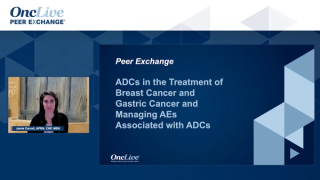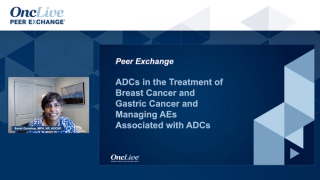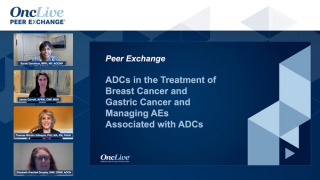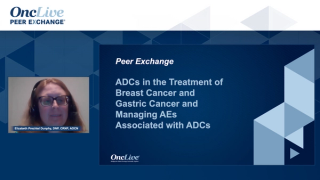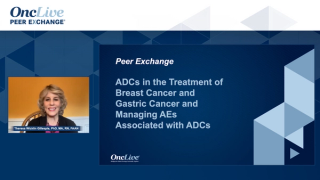
Gastrointestinal Cancer
Latest News
Latest Videos

More News

The combination of tislelizumab, irinotecan, paclitaxel, oxaliplatin, and 5-FU/leucovorin demonstrated promising efficacy and manageable safety in gastric and GEJ cancers.

The addition of trastuzumab and pertuzumab to chemotherapy was associated with increased toxicity in patients with HER2-positive gastric cancers enrolled in the INNOVATION trial.

Managing weight loss with telotristat ethyl in patients with metastatic pancreatic ductal adenocarcinoma may improve survival, although further research is needed.

Phone calls to follow up with patients with locally advanced esophageal squamous cell carcinoma while at home may reduce AEs like stomatitis before the first outpatient clinic visit.

Phase 2 findings show clinical responses and improved survival with evorpacept in patients with HER2-positive gastric/gastroesophageal cancer.

The phase 2 FDZL-001 trial showed high overall survival and progression-free survival rates with camrelizumab plus Nab-POF in patients with gastric/GEJ cancer.

The EA2186 trial was the first study specifically designed to test chemotherapy in older adults with advanced pancreatic cancer who were considered vulnerable.
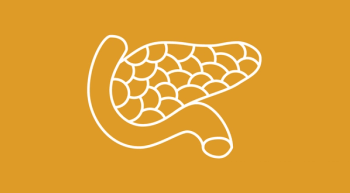
Analysis of the NAPOLI 3 trial showed that lower doses of liposomal irinotecan or oxaliplatin did not reduce survival in patients with pancreatic ductal adenocarcinoma.

Susumu Hijioka, MD, discussed how a lower dose of everolimus may help address certain adverse events like oral mucositis and hypoglycemia.

First-line nivolumab plus ipilimumab was shown to be effective and well-tolerated in patients with unresectable hepatocellular carcinoma in the CheckMate 9DW study.

Cabozantinib prolonged PFS compared to placebo for patients with extrapancreatic NETs starting in the GI tract in a subgroup analysis of the CABINET trial.

Preoperative Sintilimab with Chemoradiotherapy Boosts Response Rates in Resectable Esophageal Cancer
Preoperative sintilimab with chemoradiotherapy boosted pathological complete response rates in patients with resectable, locally advanced esophageal squamous cell carcinoma.

Findings from this survey also demonstrated that 23% of providers were comfortable with interpreting biomarker testing results for treatment decision-making.
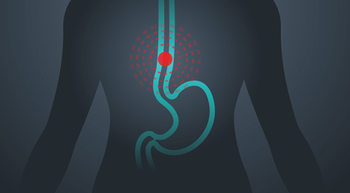
The phase 3 RATIONALE-306 study found no significant difference in overall survival benefits from tislelizumab plus chemotherapy between early and late responders with ESCC.

Five-year data shows lasting benefit for patients with advanced gastroesophageal cancers treated with nivolumab and chemotherapy.
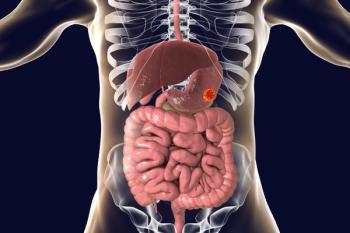
SHR-1701 plus CAPOX chemotherapy reduced treatment delays and dose reductions compared with placebo plus CAPOX in HER2-negative gastric/GEJ cancer.
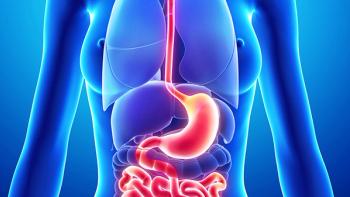
Nivolumab plus chemotherapy improved long-term survival in Chinese patients with advanced gastric, GEJ, or esophageal cancer.

Oncology nurses can provide patients with information regarding the risks and benefits of these medications in cancer treatment.

Everolimus plus lanreotide resulted in a progression-free survival of 29.7 months in patients with gastroenteropancreatic neuroendocrine tumors, compared with 11.5 months with everolimus monotherapy.

Patients receiving ponsegromab experienced significantly greater weight gain and physical activity than those receiving placebo.

Phase 1 data indicate invikafusp alfa's potential as a precision cancer immunotherapeutic in solid tumors that have progressed after PD-(L)1 therapy.

The phase 3 PANOVA-3 trial, designed to evaluate concomitant treatment with tumor treating fields and chemotherapy, met its primary end point of overall survival in unresectable, locally advanced pancreatic adenocarcinoma.

The FDA granted an accelerated approval to zanidatamab-hrii for previously treated, unresectable or metastatic HER2-positve biliary tract cancer.

This retrospective review demonstrates the increased use of active surveillance in patients with small nonfunctional pancreatic neuroendocrine tumors.

Developing a strong working relationships and understanding the physical and emotional demands of the oncology specialty are some ways nurses can address burnout, an expert said.






